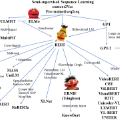Recently, language models have demonstrated strong performance on various natural language understanding tasks. Language models trained on large human-generated corpus encode not only a significant amount of human knowledge, but also the human stereotype. As more and more downstream tasks have integrated language models as part of the pipeline, it is necessary to understand the internal stereotypical representation in order to design the methods for mitigating the negative effects. In this paper, we use counterexamples to examine the internal stereotypical knowledge in pre-trained language models (PLMs) that can lead to stereotypical preference. We mainly focus on gender stereotypes, but the method can be extended to other types of stereotype. We evaluate 7 PLMs on 9 types of cloze-style prompt with different information and base knowledge. The results indicate that PLMs show a certain amount of robustness against unrelated information and preference of shallow linguistic cues, such as word position and syntactic structure, but a lack of interpreting information by meaning. Such findings shed light on how to interact with PLMs in a neutral approach for both finetuning and evaluation.
翻译:近来,语言模型在各种自然语言理解任务上展现出了强大的性能。训练于大规模人类生成的语料库上的语言模型不仅编码了大量的人类知识,还包含了人类的刻板印象。随着越来越多的下游任务将语言模型作为管道的一部分,有必要了解内部的刻板印象表现,以便设计减轻负面影响的方法。在本文中,我们使用反例来检查预训练语言模型(PLMs)中的内部刻板印象知识,这些知识会导致刻板偏好。我们主要关注性别刻板印象,但该方法可以扩展至其他类型的刻板印象。我们评估了7个PLM在9种不同信息和基础知识的填空提示下的表现。结果表明,PLMs对不相关信息和浅层语言提示的偏见具有一定的鲁棒性,如单词位置和句法结构,但缺乏通过意义诠释信息的能力。这些发现为如何以中立的方式与PLMs进行微调和评估提供了启示。


